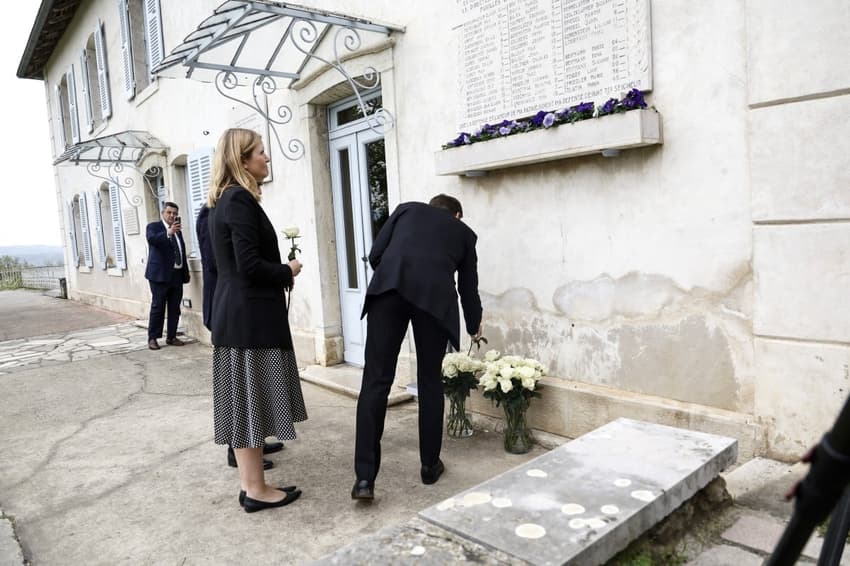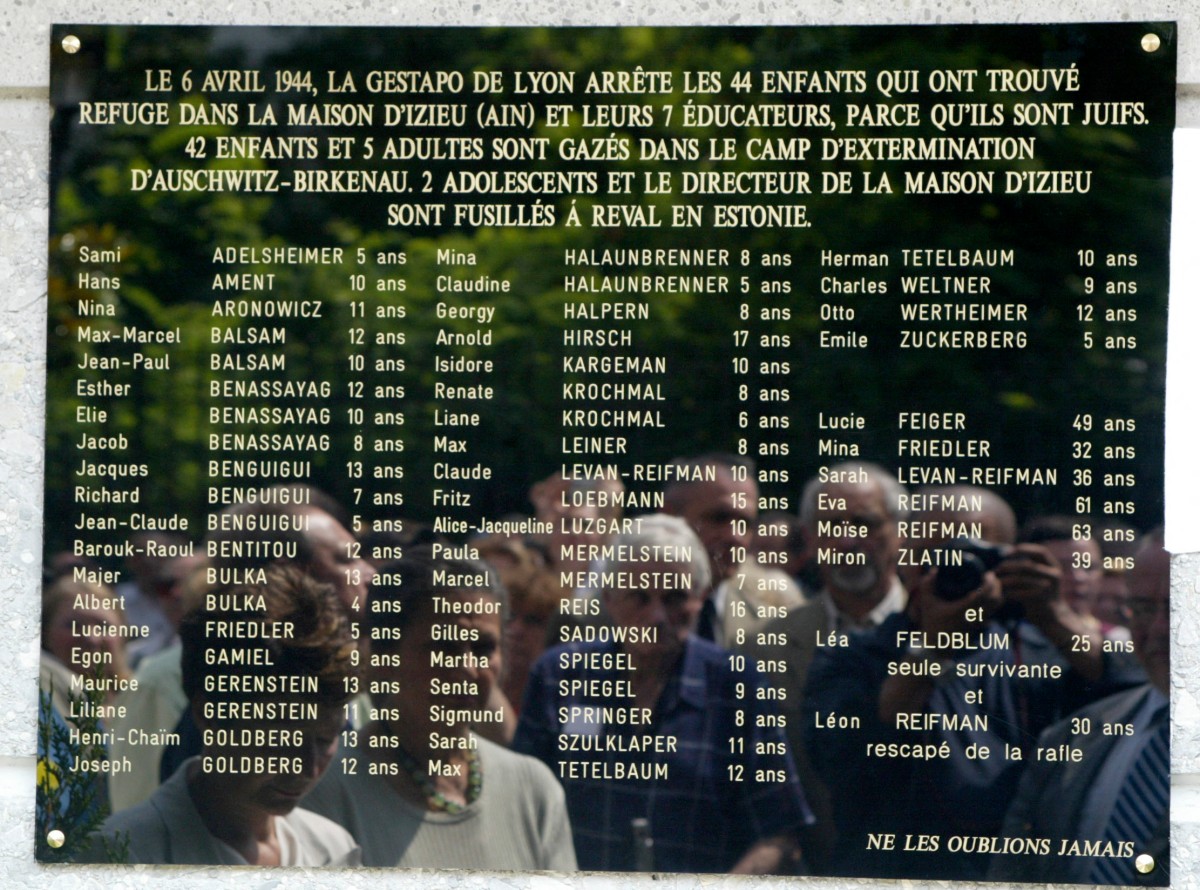80 years on, Macron leads tribute to victims of Nazi raid on Jewish orphanage

French President Emmanuel Macron on Sunday marks 80 years since Nazi forces raided a Jewish orphanage in the southeast of France and sent almost all its occupants to extermination camps.
The event is among the first of a sequence of ceremonies Macron will lead this year to mark eight decades since the penultimate year of World War II that in the summer of 1944 saw D-Day followed by the liberation of Paris from Nazi occupation.
A handful of former residents of the orphanage in the village of Izieu are due to attend the ceremony headed by Macron late Sunday afternoon.
On April 6, 1944, the 44 Jewish children aged four to 12 then hosted in the orphanage were rounded up by the Gestapo with their seven instructors, also Jewish.
The raid was carried out on the orders of Klaus Barbie, the notorious Nazi known as the "Butcher of Lyon". Barbie fled to South America after the war but was extradited from Bolivia to France in 1983 and in 1987 was sentenced to life imprisonment on charges of crimes against humanity. He died in prison in 1991.
All the Izieu victims were deported to the death camps of Auschwitz-Birkenau in Poland or Reval in Estonia. Only one instructor survived.

This file photo shows a commemorative plate with the names of the 44 Jewish children and their 7 teachers who were deported on April 6, 1944 by Nazi forces. (Photo by Mehdi FEDOUACH / AFP)
Until then it was "a magnificent place", where the children could be "among friends", take classes or take a walk as in peacetime, remembered Roger Wolman, 85 years old, who left the orphanage in 1943.
Between May 1943 and April 1944, the Izieu colony, founded by Sabine Zlatin, a Jewish resistance fighter of Polish origin, took in around 100 children whose parents had been deported. Until the raid, it had been left relatively unmolested.
"We went to school, we had a quiet life" even if the adults knew that "it was becoming more and more dangerous", said Bernard Waysenson, who arrived at the end of the summer of 1943 with his sister and brother. They left at the end of November of the same year to join their family.
'Survival'
Like him, seven former residents will participate in the commemorations organised by the museum inaugurated 30 years ago.
"The memory I have of the war is above all our survival," Waysenson told AFP.
The event will see the celebration of "the commitment of those who stood up against Nazism by welcoming the victims of persecution, and of those who opposed the abomination of republican values, by bringing the executioner Klaus Barbie to justice," the French presidency said.
Macron earlier paid tribute to 106 resistance fighters buried in mountain plateau of Glieres, also in the Alps, which was an important hub for the French resistance against Nazi rule.
From January to March 1944, 465 resistance fighters gathered at Glieres to receive airdrops of weapons in the run-up to the Allied landings in the south of France in August 1944.
But the German army decided to attack in late March of that year. Two thirds of the resistance fighters were taken prisoner and 124 killed during the fighting or shot. Nine disappeared and 16 died in deportation.
"At an altitude of 1,400 meters, France rose up. It lived as it should never have ceased to live, as it should never cease to exist," Macron said.
Macron emphasised that the battle could not simply be seen as French on one side, fighting Germans on another.
"French people imprisoned French people, French people murdered French people," he said, referring to the collaborators and describing this as a "French tragedy".
These years' commemorations will reach a peak with ceremonies for the 80 years since the Normandy landings of D-Day in June. A host of world leaders are expected to attend, including US President Joe Biden.
In August, the 1944 liberation of Paris from Nazi occupation will be marked.
Comments
See Also
The event is among the first of a sequence of ceremonies Macron will lead this year to mark eight decades since the penultimate year of World War II that in the summer of 1944 saw D-Day followed by the liberation of Paris from Nazi occupation.
A handful of former residents of the orphanage in the village of Izieu are due to attend the ceremony headed by Macron late Sunday afternoon.
On April 6, 1944, the 44 Jewish children aged four to 12 then hosted in the orphanage were rounded up by the Gestapo with their seven instructors, also Jewish.
The raid was carried out on the orders of Klaus Barbie, the notorious Nazi known as the "Butcher of Lyon". Barbie fled to South America after the war but was extradited from Bolivia to France in 1983 and in 1987 was sentenced to life imprisonment on charges of crimes against humanity. He died in prison in 1991.
All the Izieu victims were deported to the death camps of Auschwitz-Birkenau in Poland or Reval in Estonia. Only one instructor survived.

Until then it was "a magnificent place", where the children could be "among friends", take classes or take a walk as in peacetime, remembered Roger Wolman, 85 years old, who left the orphanage in 1943.
Between May 1943 and April 1944, the Izieu colony, founded by Sabine Zlatin, a Jewish resistance fighter of Polish origin, took in around 100 children whose parents had been deported. Until the raid, it had been left relatively unmolested.
"We went to school, we had a quiet life" even if the adults knew that "it was becoming more and more dangerous", said Bernard Waysenson, who arrived at the end of the summer of 1943 with his sister and brother. They left at the end of November of the same year to join their family.
'Survival'
Like him, seven former residents will participate in the commemorations organised by the museum inaugurated 30 years ago.
"The memory I have of the war is above all our survival," Waysenson told AFP.
The event will see the celebration of "the commitment of those who stood up against Nazism by welcoming the victims of persecution, and of those who opposed the abomination of republican values, by bringing the executioner Klaus Barbie to justice," the French presidency said.
Macron earlier paid tribute to 106 resistance fighters buried in mountain plateau of Glieres, also in the Alps, which was an important hub for the French resistance against Nazi rule.
From January to March 1944, 465 resistance fighters gathered at Glieres to receive airdrops of weapons in the run-up to the Allied landings in the south of France in August 1944.
But the German army decided to attack in late March of that year. Two thirds of the resistance fighters were taken prisoner and 124 killed during the fighting or shot. Nine disappeared and 16 died in deportation.
"At an altitude of 1,400 meters, France rose up. It lived as it should never have ceased to live, as it should never cease to exist," Macron said.
Macron emphasised that the battle could not simply be seen as French on one side, fighting Germans on another.
"French people imprisoned French people, French people murdered French people," he said, referring to the collaborators and describing this as a "French tragedy".
These years' commemorations will reach a peak with ceremonies for the 80 years since the Normandy landings of D-Day in June. A host of world leaders are expected to attend, including US President Joe Biden.
In August, the 1944 liberation of Paris from Nazi occupation will be marked.
Join the conversation in our comments section below. Share your own views and experience and if you have a question or suggestion for our journalists then email us at [email protected].
Please keep comments civil, constructive and on topic – and make sure to read our terms of use before getting involved.
Please log in here to leave a comment.